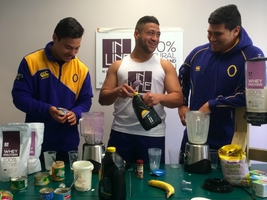
So what’s the deal with carbs? Do we need them or are they just going to make us fat? This week Rugbydump Academy’s TJ Jankowski discusses the importance of carbs and how you can use them to perform, look and feel better.
So let’s discuss carbs, they get a mixed reaction in today’s society. Some people think they are the sole-reason for the obesity epidemic the western world is facing. Others just love carbs (who can blame them).
The reality is that as a rugby player, you get to view carbs differently than most people. This is because you train/play (and party) hard. So today we’re going to look at 5 rules for carbohydrates and rugby that you should be following.
You Should Be Eating Carbs
Let’s get one thing clear, carbs are not the devil, they are fuel.
Your body uses carbohydrates that you consume by either converting them to glucose and sending them straight into the bloodstream for energy, or by converting them to glycogen (a large number of glucose bound together) and storing them in the liver and around the body for when energy is needed.
Some of you will know that the body also uses fat for fuel. So how come we can’t just use fat as our fuel?
Because of it’s complex and fuel-efficient nature, fat is used as fuel for normal day-to-day activity and low intensity exercise such as walking. So if you aren’t doing anything more than this you probably won’t need carbs (aside from the mental side of how good they taste).
Once you get into more intense activity (like rugby), the body’s primary fuel source becomes glycogen. If your body runs out of glycogen, then you may still be able to do the activity, but your performance will dramatically decrease.
This has been shown consistently in sport science studies – both glycogen stores and blood glucose levels are very strongly linked to performance markers and perceived fatigue. Basically, if you don’t have glycogen or glucose freely available in your system, then your performance will drop.
Obviously rugby is a high intensity activity, as is the vast majority of training activities for rugby. The better you can train, the greater your results are going to be. Supplying your body with carbs is going to help your performance not only receive a boost, but you should be able to maintain that boost for longer.
Carbs Should Be Used To Fuel Recovery Post Training

This is one piece of advice that I think I will continue telling guys until the end of time.
If you want to recover as best as possible from a training session, you need to fuel your body with more carbs than protein. I still see people every day having a shake of just protein powder to consume after they’ve finished training.
Protein is important, but alone will provide a snippet of the benefits that carbs will have. This is such an easy switch that you can do right away.
You can throw some gatorade in your protein shake (or kool-aid… it’s cheaper). You don’t even need to have a shake, just wait til you get home and have a giant meat-lovers pizza from Dominos eat a lean protein source with some carbs (rice/potatoes/pasta).
Protein is what is used to “build the muscle” and recover, but without carbs, it is much harder for the body to actually have the energy to go through that process.
Avoid Too Many High Fibre Carbs On Game Day
Everyone’s parents told them to eat their veggies right? Or if not at least Hulk Hogan told us, which is probably more important. Anyway, everyone knows that veggies are needed to be eaten. Think “healthy diet” and you think veggies.
In spite of all this goodness that vegetables bring to us there is a time and a place where you actually need to limit your vegetable intake. Pre-game.
Vegetables are high in fibre, which in day-to-day life is great, it helps our digestive system process all of the nutrients from what we eat and keeps us nice and full whilst it does all this.
On a game-day this is actually what we want to avoid, if our bodies are still processing food that is going to be taking away from the vigorous 80 minute activity that we’re about to do.
Most of your food on game-day should be slow-digesting carbohydrates and a bit of protein (yoghurt and some oats works as a great breakfast). This will help keep your gut clear and stress free and allow you to play at your best.
You Should “Carb Load” The Day Before a Game

As I stated in the beginning, when your body runs out of glycogen, your performance drops. In an 80 minute game there is a good chance of this happening at some point if you didn’t start the game fully-stocked up. So how much is enough to try and prevent this?
We can store around 500g of carbohydrates in our muscles at any one time. This simply cannot be consumed on the day of a match, you wouldn’t be able to process it. Therefore eating a few higher-carbohydrate meals the day before is the best solution.
You can spread it over the course of a day, having a number of carb-dense meals, and it is easily done.
Remember that we’re aiming for higher carbohydrates here, not an increase in protein and fat so in spite of what some may tell you KFC isn’t the best choice. I’ll reiterirate that again, do not just eat junk food and justify it as carb-loading, you will just increase bodyfat over time which will obviously negatively affect your performance.
Utilize Lower Carbohydrate Intake On Easy/Off Days
We know the importance of carbs to fuel your performance and recover after tough sessions. There is also some research to suggest that having days with a reduced carb intake has a number of benefits.
Without getting too sciencey on you it can:
– make the muscle cells more efficient at getting work done)
– increase the mitochondria produced in cells (allowing you more capacity to work)
– increase fat burning
– avoid fat storage
It is important that these lower carb days are done on the right days – you want them on your easier training days and your days off. I would also say to be cautious of doing this on the day after a game, as you will probably need some carbohydrates to recover.
In Summary
Just like so many things I’ve written about, carbs are an important tool to use in your training and rugby career. Using them in the right way can push your performance and results to truly reaching your potential. They are not evil.
About TJ JankowskiTJ Jankowski is a former international rugby player for Poland rugby, who achieved their highest world ranking of 23 whilst he was part of the team. |
|

Sign In